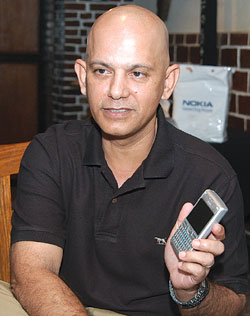|
|
Nokia is entering the Nepali mobile phone market in a big way, hoping to cash in on the rapid growth of the mobile telecom market. Prem Prakash Chand, general manger of Nokia's Emerging Asia spoke with Nepali Times about combating smuggling and Nokia's plans for the future in Nepal.
Nepali Times: What sort of mobile telecom potential do you see in Nepal?
Prem Prakash Chand: At present there are two billion mobile subscribers globally. It took us over ten years to get the first billion, and five years to get the next. Eighteen months ago we believed the total would reach three billion by 2009. Now, however, we think that will happen by the end of this year.
Countries like Nepal, Bangladesh, Bhutan, Sri Lanka, and Maldives are what we call Emerging Asia. The next billion subscribers will come from these emerging markets. In Nepal, the government is ready to deregulate the market and it is ready to take off. That's why Nokia needs to be here.
How do you see the market in Nepal evolving?
Nepal is where countries like Australia used to be ten years ago. The biggest advantage here is that these markets do not need to evolve. In countries like Australia, the market evolved from voice-centric devices to SMS, then MMS, and now they have web browsing and email. But Nepal can go straight through, because the technology is already there. Markets like Nepal will go through a revolution and not have to wait 10 years to get to where Australia or Singapore are today.
What are some of the challenges you foresee?
Of the handsets available in Nepal, 90 percent are brought in illegally, thus depriving government of revenue. Consumers are also being cheated of value, because they may end up buying a handset that is perhaps not genuine, is refurbished, or has counterfeit batteries. Illicit trade is a big challenge, but you can control it. For example in Bangladesh, when we entered, illicit trade was 80 percent, but in 12 months we'd halved that. It is about having the willpower, having media advocate for authorised handsets, and a government that understands the long term gains that come by supporting the industry.
What are some of your goals for the Nepali market?
A recent piece of research shows that the GDP of a country increases by 0.6 percent per 10 percent increase in mobile penetration. The government needs to be aware of how this industry can contribute to the economy. Deregulating the market and making handsets available to the masses benefits the overall economy. After the government realises what the industry can contribute, it needs to put into place a system to assist in the acceleration of the industry. The government could start by reducing the heavy duties and taxes Nepali consumers have to pay on mobile services.
We are lobbying the government and are in the process of setting ourselves up. We've just appointed two distributors-Neoteric and Paramount Electronics. We need to make handsets more affordable and accessible to the consumers, and accessibility comes from distribution. One way to cut down on the number of grey market handsets is to have authorised distributors here. We hope to then embark on consumer education on mobility.
What are some of the products you are pushing in Nepal?
When you are looking at a country which has low affordability, you want products for a critical mass. We want to encourage a variety of entry-level phones like the Nokia 1110i that are easy to use, durable, and have a longer battery life. We will also offer feature-filled devices such as the Nokia Nseries, Eseries, and the Nokia 8800 Sirocco Edition, but our focus will be on low-end devices.
How do you plan to convince buyers to come straight to you?
We want to raise consumer awareness, so we will be involved in doing above the line communication about Nokia's presence in the market. We'll be setting up customer care points, and recruit retailers and train them in what mobility is all about. There will be Nokia branded outlets and concept stores (where you can try out new tools and devices).
What's the long-term plan?
Nepal does not have very high fixed teledensity, so the demand and potential of mobile internet is going to be significant in the future. We see a revolution in mobile internet in Nepal soon-mobile devices used for entertainment, music, video clips, mobile tv, GPS for direction. What's exciting is that for a lot of people in countries like Nepal, the first time they ever talk on the phone will be on a mobile device. Our vision is to be able to provide that experience.



